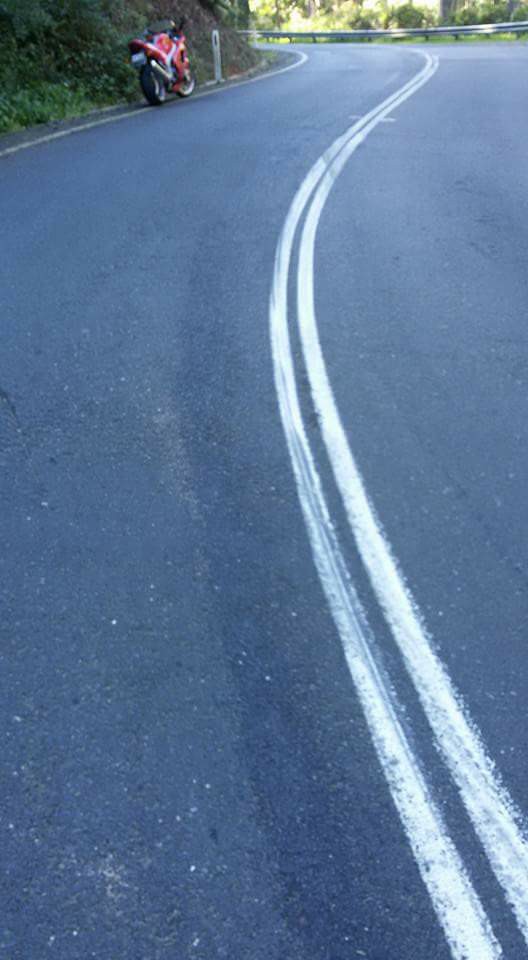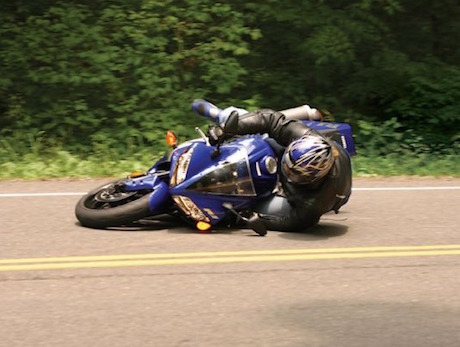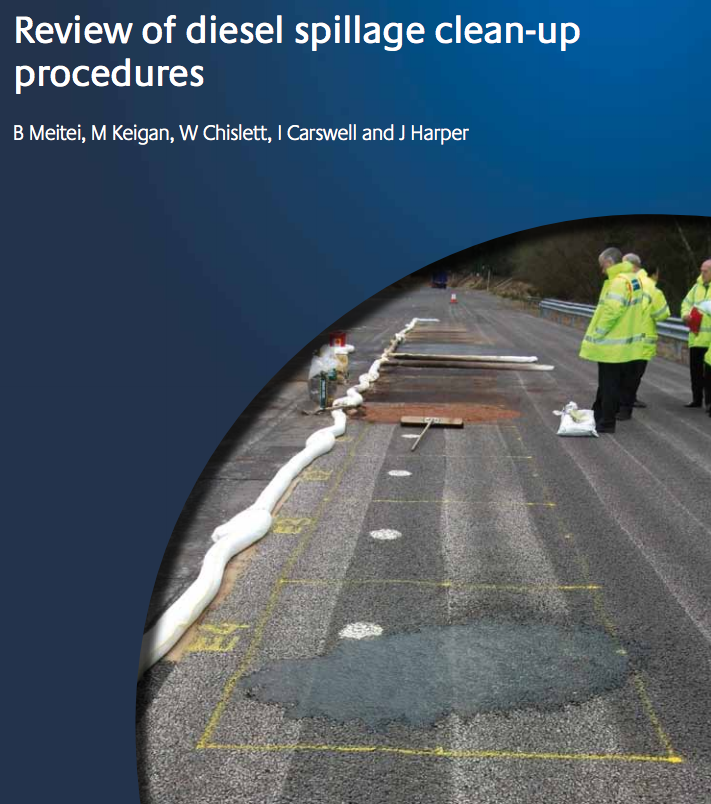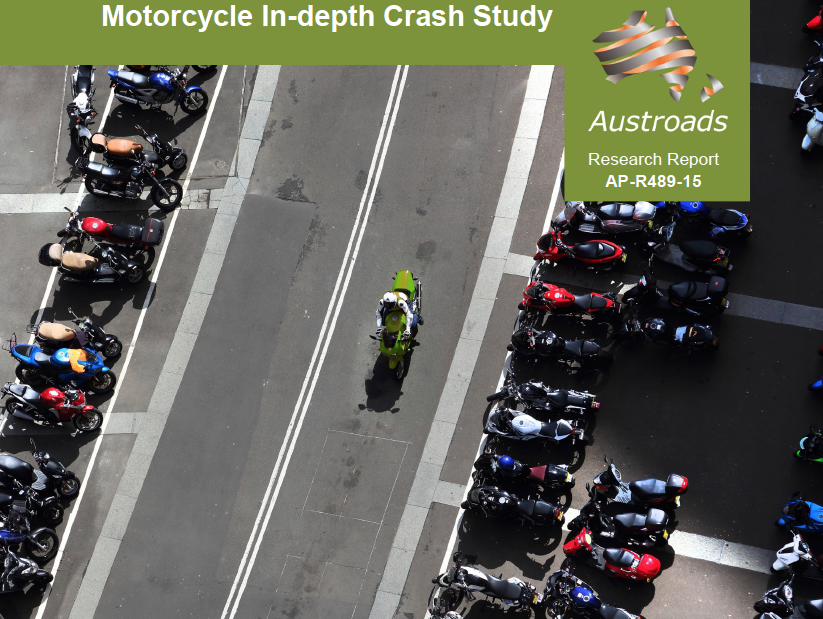Diesel and oil spills on our roads most endanger motorcyclists, yet there seems no approved national procedure for reporting or fixing them.
Two recent major diesel spills in South East Queensland occurred on two very popular motorcycle roads.
The first was caused by a broken-down truck on the northern approach to Tamborine Mountain near the famed Rock Piano graffiti and the second was on a hairpin on the Samford side of the Mt Mee Rd.

Transport and Main Roads says they were made aware of a spill on Tamborine Mountain which was cleaned up by emergency services “so no further action was taken”.
“We have not received reports of a spill on Mt Mee Road north of the outlook.”
Like most states, TMR relies on fire and emergency rescue to clear up minor spills. They only deal with major spills and usually via a contractor.
Dangers of oil and diesel spills
An Austroads 2015 Motorcycle In-Depth Crash Study report found that a slippery road surface accounted for 13% of single-vehicle crashes.
“There is a need to find enhanced methods for preventing and/or mitigating oil/diesel spills to better reduce the risk to motorcyclists,” it found.
Despite spills causing just 0.12% of all crashes in the UK, a 2010 Transport Research Laboratory study of spills found they were a “legitimate concern” for motorcyclists.
It estimated the value of prevention motorcycle crashes caused by oil and diesel spills was about $30m in the UK in 2008.
Ride to the conditions
We all know that we should ride to the conditions, but you never know where an oil or diesel spill will occur and they can be difficult to spot.
Diesel spills are particularly difficult to see, but if the light is right, you may see a rainbow or a dark patch.
Usually the first sign of a diesel spell is the distinctive smell. By then, it may be too late as you are in the spill and hitting the brakes could lead to a crash.
Try to roll through with smooth steering and without any throttle or brake.
Spills can be caused by motorists overfilling the full tanks of diesel cars and trucks, not putting the filler cap back on properly, failed spill devices on trucks, old vehicles leaking oil and diesel, breakdowns and crashes.
How to report a spill
If you identify a spill, you should report it immediately to the local council, or the state transport department if it is a state-controlled road.
If you have mobile phone signal, go to the local or state authority’s website and look for a hotline or 24-hour line for reporting road damage.
Otherwise, file these away in your contacts: Queensland 131 940; NSW 131 700; Victoria 131 170; Tasmania 1300 139 933; South Australia 1800 018 313; Western Australia 138 138; and NT 1800 246 199. We couldn’t find a number for the ACT, but you can lodge a report online here.
If possible, stay at the site to warn other riders and motorists until the authorities arrive.
The AustRoads report recommends methods for reducing response times to emergency clean-ups and suggested the public should “respond quickly and call emergency services when debris, including oil/diesel is observed on the roadway”.
A NSW report, titled “Making roads more motorcycle friendly”, says “any diesel or oil spills need to be cleaned up immediately and appropriate warning signs used”.
Despite this rhetoric, response to spills by authorities in Australia seems dreadfully slow, especially on weekends when most motorcyclists are riding.
But it’s in the interests of authorities to fix spills quickly, not just to avoid litigation from crash victims, but to preserve their expensive road infrastructure!
Diesel spills degrade the asphalt surface and can cause potholes over time.
So it’s a long-term cost-saving for authorities to fix them quickly.
Be aware that oil and diesel spills on the road can take more than 100 days to completely dissipate and they can resurface during rain, so steer clear for some weeks if there has been a spill.
Most state transport department websites will have a list of spill zones to avoid.
How to fix oil and diesel spills
The 2015 AustRoads report does not recommend best practices for cleaning up an oil or diesel spill.
Consequently, authorities in each locale use different treatments.
The traditional and cheapest method is sand which can cause motorcycles to slip and crash if not cleaned up properly.
It also doesn’t absorb very well and is not suitable when it is raining.

Other absorbent materials have been used such as wood chips, hay, sawdust, cork, dried corn, wool, recycled newspaper and even old telephone books!
Chemical absorbents include polyurethane, polyethylene and polypropylene which react quickly but can be environmentally unsound.
The most common used in Australia is simply called “kitty litter” and combines several of the above ingredients.
There are also surface washing agents and degreasers which are quick and don’t affect the environment.
The US EPA has also used enzyme additives that speed up biodegradation of oil and diesel, but they are expensive, slow and only work in certain climates.
Some of the interesting names for oil and diesel clean-up materials on the market include Pig Peat, Rubberizer, C.I.Agent, Oil-Dri, Green Stuff, Sphag Sorb, Spill Hound, Biozorb, and Australian product KleenSweep.
The most suitable fix is to quickly apply absorbent material followed by vigorous sweeping with a stiff brush until the diesel or oil is removed.
The used absorbent is then removed and the area inspected. Reapplication may be necessary as dried diesel and oil can become slippery again if it rains.





